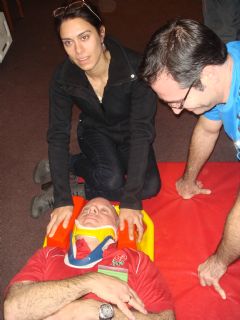After an early start & the usual introductions, we launched into a full programme of lectures & practical skill stations covering basic life support, advanced life support, initial assessments, airway management, breathing & chest trauma, circulation & shock, surgical airway management, IV access, head injuries & neurological assessment, facial, dental & eye injuries & spinal trauma. Our group was headed mentored by Barney Kenney, the head physio at the RFU accompanied by Phil Riley, a paramedic & faculty member.
Whilst most of this was revision for me, certain details have changed since I last did the course. For example, the finer points of the chest compressions of CPR have changed (compression depth of 5-6cm in adults, with pressure applied through the centre of the chest), whilst the introduction of oropharyngeal tubes is now right way up & assisted with a tongue depressor, introduced as the upside-down/rotation method was found to be causing too much oral trauma.
Where this course has so far proved more detailed than previous courses I have attended is that we were able to perform needle & surgical cricothyroidectomies (last chnace saloon methods of providing an airway) in addition to decompression needle thoracocentesis (used in the management of tension pneumothoraces) on sheep thoraces & oesophages. We also used improved versions of the scoop stretcher than I have previously encountered & had the chance to try out some pieces of kit that are normally reserved for combat situations.
Tomorrow we are working through fracture & dislocation reduction & relocation techniques, a few more scenarios before our written & practical exams. I would like to think I will take the time to do some revision tonight but tiredness has hit me after my travel back from Kenya & as Gerry ended up doing a 3am cross town dash to attend to his son, who was rather unwell, only returning at 6am, I think it might be an early night!

